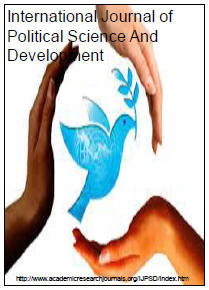| IJPSD |
International
Journal of Political Science and Development |
||||||||||||||||||||||
|
International Journal of Political Science and Development Vol. 2(11), pp. 314–327, December, 2014. DOI: 10.14662/IJPSD2014.063 ISSN: 2360-784X
Research Paper
ETHIO-ERITREAN POST-SECESSION HOSTILITY: LESSONS FOR SUDAN AND SOUTH SUDAN
Kidanu Atinafu
Department of Civic and Ethical Studies, College of Social Sciences and Humanities, Arba Minch University, Arba Minch, Ethiopia. Email; kidanuatinafu@yahoo.com
Accepted 18 December 2014
The central focus of this paper is on drawing lessons for Sudan and
South Sudan after examining the Ethio-Eritrean post-secession hostility.
Through examining various documents qualitatively and ascertaining the
view of key informants, the study has come up with the following
findings. First, the post-secession Sudan and South Sudan
destabilization and proxy engagement need to be repudiated since it
complicates the normalization process and widen the existing mistrust
and animosity. Second, the culture of militarism needs to be replaced by
a new political and diplomatic approach. Third, the negative
implications of unaccountable and authoritarian rule should to be
overcome and replaced by a democratic system of governance where the
power of the elite is limited, the voice of the public heard and the
rights of civil-political organizations guaranteed. Fourth, the forceful
and abusive deportations of nationals of each other must come to an end
since it threatened bilateral relations and people to people cordiality.
Fifth, the issue of political will and compromise is also fundamental to
Sudan and South Sudan to solve various unresolved issues including
border disputes. Institutionalization of their relations and
implementation of the agreements in good faith is the other compelling
lesson to be drawn thereof by the Sudan and South Sudan. Cite This Article As: Atinafu K (2014). ETHIO-ERITREAN POST-SECESSION HOSTILITY: LESSONS FOR SUDAN AND SOUTH SUDAN. Inter. J. Polit. Sci. Develop. 2(11): 314-327
|
|
|||||||||||||||||||||
